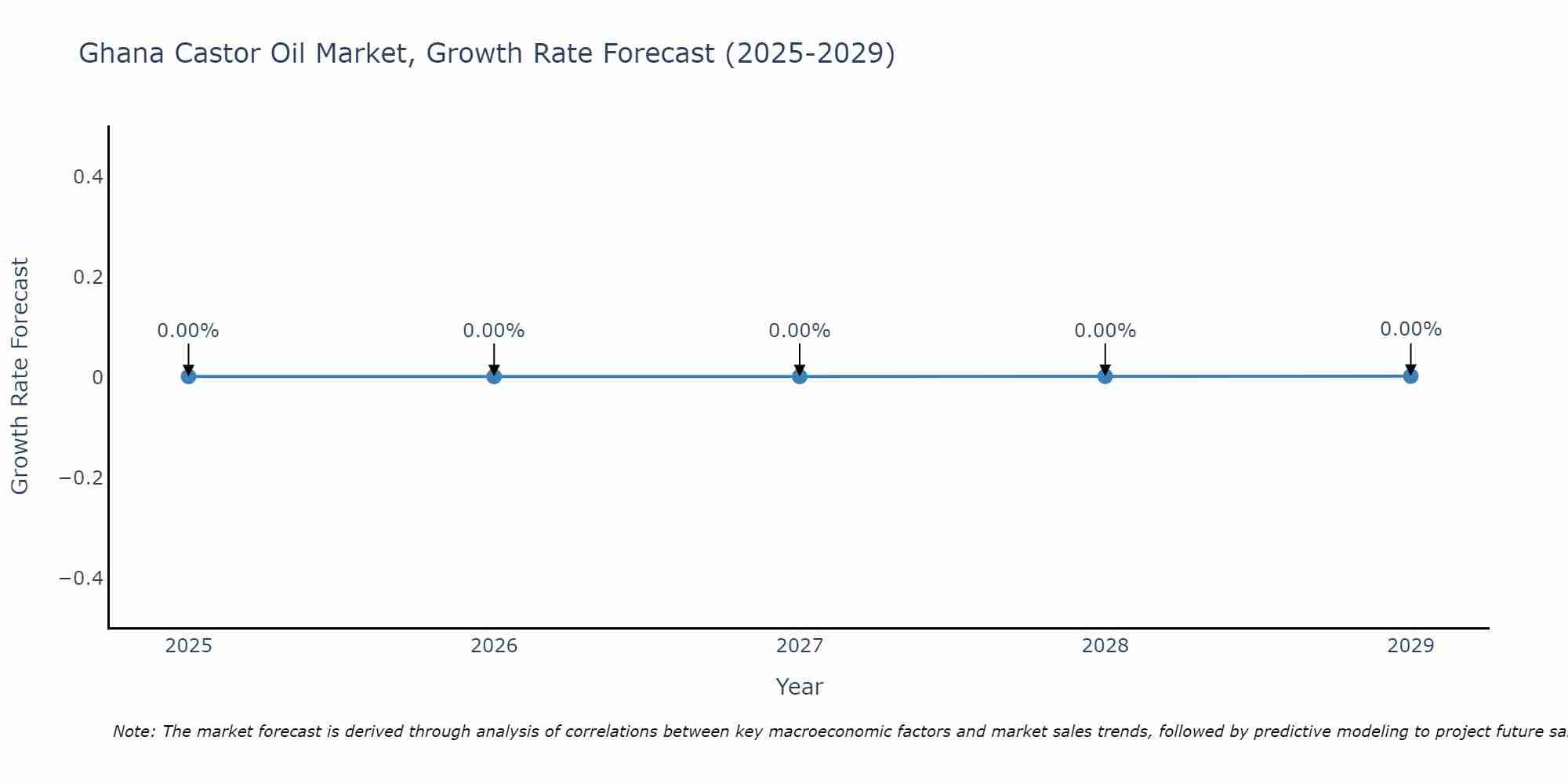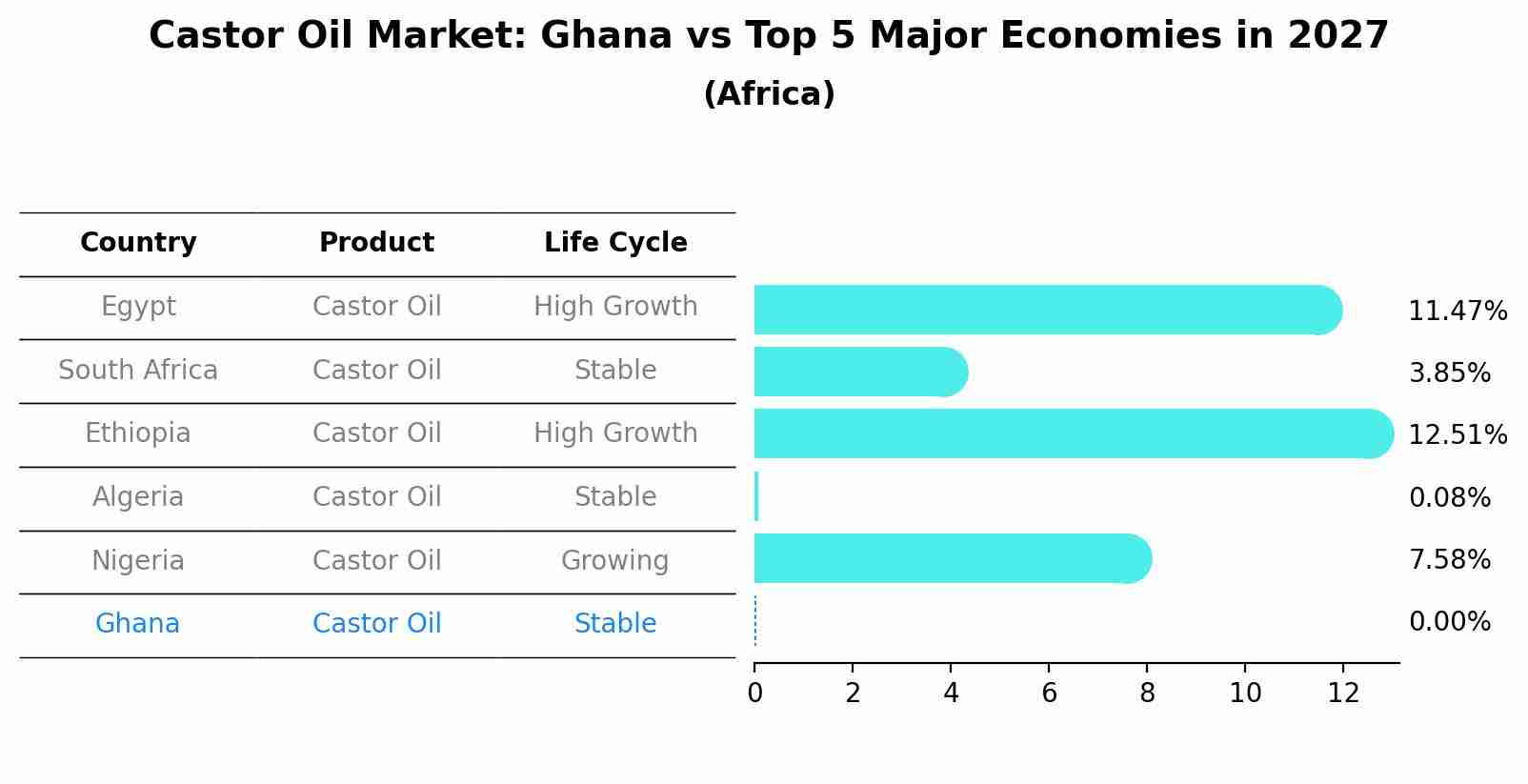Ghana Castor Oil Market (2025-2031) Outlook | Share, Size, Trends, Growth, Analysis, Industry, Companies, Forecast, Revenue & Value
| Product Code: ETC410092 | Publication Date: Oct 2022 | Updated Date: Apr 2025 | Product Type: Market Research Report | |
| Publisher: 6Wresearch | Author: Shubham Padhi | No. of Pages: 75 | No. of Figures: 35 | No. of Tables: 20 |
Ghana Castor Oil Market Size Growth Rate
The Ghana Castor Oil Market is likely to experience consistent growth rate gains over the period 2025 to 2029. The growth rate starts at 0.00% in 2025 and reaches 0.00% by 2029.

Castor Oil Market: Ghana vs Top 5 Major Economies in 2027 (Africa)
By 2027, Ghana's Castor Oil market is forecasted to achieve a stable growth rate of 0.00%, with Egypt leading the Africa region, followed by South Africa, Ethiopia, Algeria and Nigeria.

Ghana Castor Oil Market Overview
The Ghana Castor Oil Market is driven by factors such as cosmetics industry demand, pharmaceutical applications, and industrial uses. Castor oil, derived from the seeds of the castor plant, serves as a versatile ingredient in cosmetics, skincare products, pharmaceuticals, and industrial lubricants in Ghana, valued for its moisturizing, anti-inflammatory, and emollient properties.
Drivers of the market
Ghana castor oil market is driven by its diverse applications in industries such as cosmetics, pharmaceuticals, and lubricants. The oil`s natural and renewable properties, along with growing consumer awareness of its benefits, are driving market growth.
Challenges of the market
The castor oil market in Ghana faces challenges related to inconsistent supply due to weather fluctuations and limited cultivation areas. Additionally, quality control issues and competition from synthetic alternatives impact market competitiveness and export potential.
Government Policy of the market
Government interventions in the castor oil market may aim to promote sustainable agriculture, rural development, and industrial competitiveness. Policies might include support for castor oil cultivation through subsidies, extension services, and research programs to increase production and improve crop yields. Additionally, the government may facilitate market access for castor oil producers through trade agreements, value chain development, and export promotion initiatives. Capacity-building programs for farmers, cooperatives, and agricultural extension workers on sustainable farming practices, post-harvest handling, and market development may also be promoted to enhance industry sustainability and rural livelihoods.
Key Highlights of the Report:
- Ghana Castor Oil Market Outlook
- Market Size of Ghana Castor Oil Market, 2024
- Forecast of Ghana Castor Oil Market, 2031
- Historical Data and Forecast of Ghana Castor Oil Revenues & Volume for the Period 2021-2031
- Ghana Castor Oil Market Trend Evolution
- Ghana Castor Oil Market Drivers and Challenges
- Ghana Castor Oil Price Trends
- Ghana Castor Oil Porter's Five Forces
- Ghana Castor Oil Industry Life Cycle
- Historical Data and Forecast of Ghana Castor Oil Market Revenues & Volume By End Use for the Period 2021-2031
- Historical Data and Forecast of Ghana Castor Oil Market Revenues & Volume By Pharmaceuticals for the Period 2021-2031
- Historical Data and Forecast of Ghana Castor Oil Market Revenues & Volume By Lubricants for the Period 2021-2031
- Historical Data and Forecast of Ghana Castor Oil Market Revenues & Volume By Paints for the Period 2021-2031
- Historical Data and Forecast of Ghana Castor Oil Market Revenues & Volume By Soaps for the Period 2021-2031
- Historical Data and Forecast of Ghana Castor Oil Market Revenues & Volume By Others for the Period 2021-2031
- Ghana Castor Oil Import Export Trade Statistics
- Market Opportunity Assessment By End Use
- Ghana Castor Oil Top Companies Market Share
- Ghana Castor Oil Competitive Benchmarking By Technical and Operational Parameters
- Ghana Castor Oil Company Profiles
- Ghana Castor Oil Key Strategic Recommendations
Frequently Asked Questions About the Market Study (FAQs):
- Single User License$ 1,995
- Department License$ 2,400
- Site License$ 3,120
- Global License$ 3,795
Search
Thought Leadership and Analyst Meet
Our Clients
Related Reports
- Canada Oil and Gas Market (2026-2032) | Share, Segmentation, Value, Industry, Trends, Forecast, Analysis, Size & Revenue, Growth, Competitive Landscape, Outlook, Companies
- Germany Breakfast Food Market (2026-2032) | Industry, Share, Growth, Size, Companies, Value, Analysis, Revenue, Trends, Forecast & Outlook
- Australia Briquette Market (2025-2031) | Growth, Size, Revenue, Forecast, Analysis, Trends, Value, Share, Industry & Companies
- Vietnam System Integrator Market (2025-2031) | Size, Companies, Analysis, Industry, Value, Forecast, Growth, Trends, Revenue & Share
- ASEAN and Thailand Brain Health Supplements Market (2025-2031) | Strategy, Consumer Insights, Analysis, Investment Trends, Opportunities, Growth, Size, Share, Industry, Revenue, Segments, Value, Segmentation, Supply, Forecast, Restraints, Outlook, Competition, Drivers, Trends, Demand, Pricing Analysis, Competitive, Strategic Insights, Companies, Challenges
- ASEAN Bearings Market (2025-2031) | Strategy, Consumer Insights, Analysis, Investment Trends, Opportunities, Growth, Size, Share, Industry, Revenue, Segments, Value, Segmentation, Supply, Forecast, Restraints, Outlook, Competition, Drivers, Trends, Demand, Pricing Analysis, Competitive, Strategic Insights, Companies, Challenges
- Europe Flooring Market (2025-2031) | Outlook, Share, Industry, Trends, Forecast, Companies, Revenue, Size, Analysis, Growth & Value
- Saudi Arabia Manlift Market (2025-2031) | Outlook, Size, Growth, Trends, Companies, Industry, Revenue, Value, Share, Forecast & Analysis
- Uganda Excavator, Crane, and Wheel Loaders Market (2025-2031) | Strategy, Consumer Insights, Analysis, Investment Trends, Opportunities, Growth, Size, Share, Industry, Revenue, Segments, Value, Segmentation, Supply, Forecast, Restraints, Outlook, Competition, Drivers, Trends, Demand, Pricing Analysis, Competitive, Strategic Insights, Companies, Challenges
- Rwanda Excavator, Crane, and Wheel Loaders Market (2025-2031) | Strategy, Consumer Insights, Analysis, Investment Trends, Opportunities, Growth, Size, Share, Industry, Revenue, Segments, Value, Segmentation, Supply, Forecast, Restraints, Outlook, Competition, Drivers, Trends, Demand, Pricing Analysis, Competitive, Strategic Insights, Companies, Challenges
Industry Events and Analyst Meet
Whitepaper
- Middle East & Africa Commercial Security Market Click here to view more.
- Middle East & Africa Fire Safety Systems & Equipment Market Click here to view more.
- GCC Drone Market Click here to view more.
- Middle East Lighting Fixture Market Click here to view more.
- GCC Physical & Perimeter Security Market Click here to view more.
6WResearch In News
- Doha a strategic location for EV manufacturing hub: IPA Qatar
- Demand for luxury TVs surging in the GCC, says Samsung
- Empowering Growth: The Thriving Journey of Bangladesh’s Cable Industry
- Demand for luxury TVs surging in the GCC, says Samsung
- Video call with a traditional healer? Once unthinkable, it’s now common in South Africa
- Intelligent Buildings To Smooth GCC’s Path To Net Zero


















